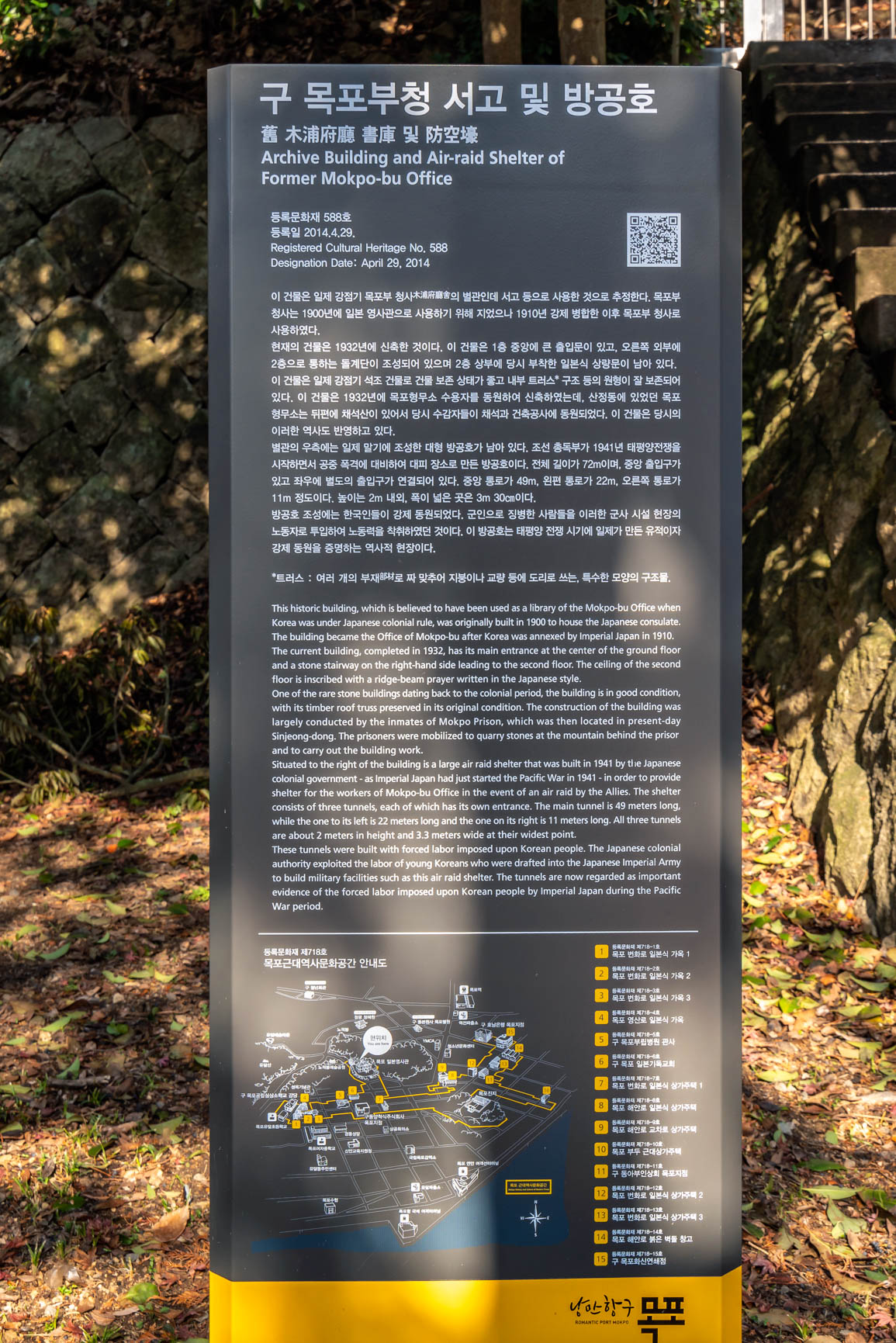Text:Heritage:M00-0588-0000
목차
구 목포부청 서고
영문 해설문
현장 안내판 해설문 내용 - 영문
Archive Building and Air-raid Shelter of Former Mokbo-pu Office
Registered Cultural Heritage No. 588
Designation Date: April 29, 2014
This historic building, which is believe to have been used as a library of the Mokpo-bu Office when Korea was under Japanese colonial rule, was originally built in 1900 to house the Japanese consulate. The building became the Office of Mokpo-bu after Korea was annexed by Imperial Japan in 1910. The current building, completed in 1932, has its main entrance at the center of the ground floor and a stone stairway on the right-hand side leading to the second floor. The ceiling of the second floor is inscribed with a ridge-beam prayer written in the Japanese style.
One of the rare stone buildings dating back to the colonial period, the building is in good condition, with its timber roof truss preserved in its original condition. The construction of the building was largely conducted by the inmates of Mokpo Prison, which was then located in present-day Sinjeong-dong. The prisoners were mobilized to quarry stones at the mountain behind the prisoner and to carry out the building work. Situated to the right of the building is a large air raid shelter that was built in 1941 by the Japanese colonial government - as Imperial Japan had just started the Pacific War in 1941 - in order to provide shelter for the workers of Mokpo-bu Office in the event of an air raid by the Allies. The shelter consists of three tunnels, each of which has its own entrance. The main tunnel ins 49 meters long, while the one to its left is 22 meters long and the one on its right is 11 meters long. All three tunnels are about 2 meters in height and 3.3 meters wide at their widest point.
These tunnels were built with forced labor of young Koreans who were drafted into the Japanese Imperial Army to build military facilities such as this air raid shelter. The tunnels are now regarded as important evidence of the forced labor imposed upon Korean people by Imperial Japan during the Pacific War period.
Air Raid Shelter
- Experiencing an air raid shelter
- Labor field
- Labor field
The shelter is an artificial cave built by forcible mobilized Koreans by the Japanese in order to use it as a shelter in preparation for bombings by airplanes during the Pacific War Period (1941 ~ 1945).
Traces of War, Air-raid Shelters
/// Cannot read ///
Yudalsan Shelter
/// Cannot read ///
문화재청 국가문화유산포털 해설문 - 영문
Archive Building and Air-raid Shelter of Former Mokpo-bu Office
Classification: National Registered Cultural Heritage 588
Name of Cultural Properties: Archive Building and Air-raid Shelter of Former Mokpo-bu Office
Quantity: 1 archive building and 1 air-raid shelter
Designated Date: 2014.04.29
Age: Japanese Imperialism Period
Address: (Daeui-dong 2-ga) 6, Yeongsan-ro 29beon-gil, Mokpo-si, Jeollanam-do
The Archive Building of the former Mokpo-bu Office was built during the early twentieth century as a depository of government records, and was affiliated with the city administration of Mokpo-bu, which was housed in the old Japanese consulate building during the Japanese Occupation.
Nearby the Archive Building is an air-raid shelter, one of many such facilities built in strategic areas across Korea by the Japanese colonial rulers, which are now regarded as an important part of the Korean heritage related to its turbulent modern history.
국문 해설문
현장 안내판 해설문 내용 - 국문
구 목포부청 서고 및 방공호
舊 木浦府廳 書庫 및 防空壕
등록문화재 588호
등록일 2014.4.29.
이 건물은 일제 강점기 목포부 청사(木浦府廳舍)의 별관인데 서고 등으로 사용한 것으로 추정한다. 목포부 청사는 1900년에 일본 영사관으로 사용하기 위해 지었으나 1910년 강제 병합한 이후 목포부 청사로 사용하였다.
현재의 건물은 1932년에 신축한 것이다. 이 건물은 1층 중앙에 큰 출입문이 있고, 오른쪽 외부에 2층으로 통하는 돌계단이 조성되어 있으며 2층 상부에 당시 부착한 일본식 상량문이 남아 있다. 이 건물은 일제 강점기 석조 건물로 건물 보존 상태가 좋고 내부 트러스* 구조 등의 원형이 잘 보존되어 있다. 이 건물은 1932년에 목포형무소 수용자를 동원하여 신축하였는데, 산정동에 있었던 목포 형무소는 뒤편에 채석산이 있어서 당시 수감자들이 채석과 건축공사에 동원되었다. 이 건물은 당시의 이러한 역사도 반영하고 있다.
별관의 우측에는 일제 말기에 조성한 대형 방공호가 남아 있다. 조선 총독부가 1941년 태평양전쟁을 시작하면서 공중 폭격에 대비하여 대피 장소로 만든 방공호이다. 전체 길이가 72m이며, 중앙 출입구가 있고 좌우에 별도의 출입구가 연결되어 있다. 중앙 통로가 49m, 왼편 통로가 22m, 오른쪽 통로가 11m 정도이다. 높이는 2m 내외, 폭이 넓은 곳은 3m 30cm이다.
방공호 조성에는 한국인들이 강제 동원되었다. 군인으로 징병한 사람들을 이러한 군사 시설 현장의 노동자로 투입하여 노동력을 착취하였던 것이다. 이 방공호는 태평양 전쟁 시기에 일제가 만든 유적이자 강제 동원을 증명하는 역사적 현장이다.
- 트러스 : 여러 개의 부재(部材)로 짜 맞추어 지붕이나 교량 등에 도리로 쓰는, 특수한 모양의 구조물.
방공호
- 방공호 피난 체험
- 노동현장
- 노동현장
방공호는 주로 태평양전쟁시기(1914~1945) 공중폭격에 대배하여 피난 장소 등으로 활용하기 위해 한국인을 강제동원하여 만든 인공동굴이다.
전쟁준비의 흔적, 방공호
유달산 장공호
문화재청 국가문화유산포털 해설문 - 국문
구 목포부청 서고 및 방공호 (舊 木浦府廳 書庫 및 防空壕)
분 류 : 등록문화재 / 기타 / 업무시설
수량/면적 : 서고 1동, 방공호 1기
지정(등록)일 : 2014.04.29
소 재 지 : 전라남도 목포시 대의동2가 1-5
소유자(소유단체) : 목포시
관리자(관리단체) :
서고는 목포 일본영사관이 일제강점기에 목포부청으로 사용될 때 문서고로 건립된 건물로, 평면 형태는 전면 폭이 좁고 깊이가 깊은 직사각형이며, 정면 중앙의 박공면은 페디먼트 형식으로 처리하고 지붕 처마 하부에는 코니스형상으로 정연하게 다듬은 석재를 수직으로 돌출시켜 마무리하는 등 관공서의 서고양식을 잘 보여주고 있다.
방공호는 일제가 제2차 세계대전을 치르면서 한반도에도 전쟁이 있을 것을 대비하여 요지마다 방공호를 만들어 대비하였는데 이곳도 일제강점기 말기 전쟁시설물의 유구에 해당하는 것으로 아픈 역사의 현장으로 가치가 있다.
안내판 갤러리

|
- 추가 현장 안내판 3개 이상이 있음.